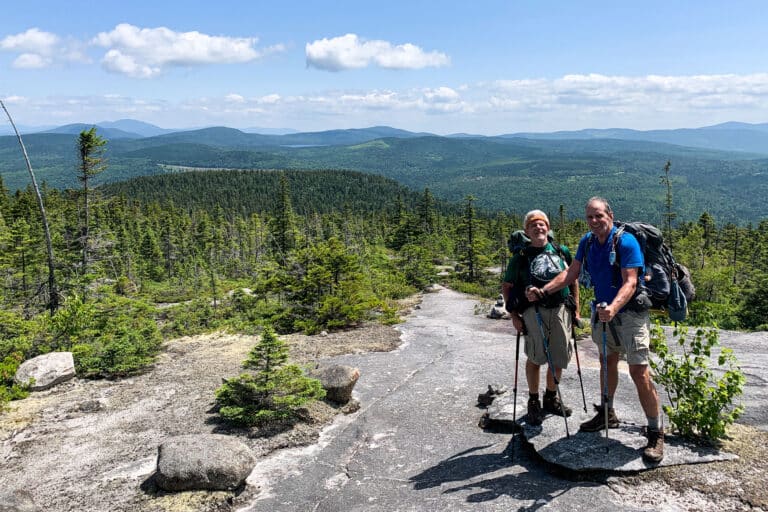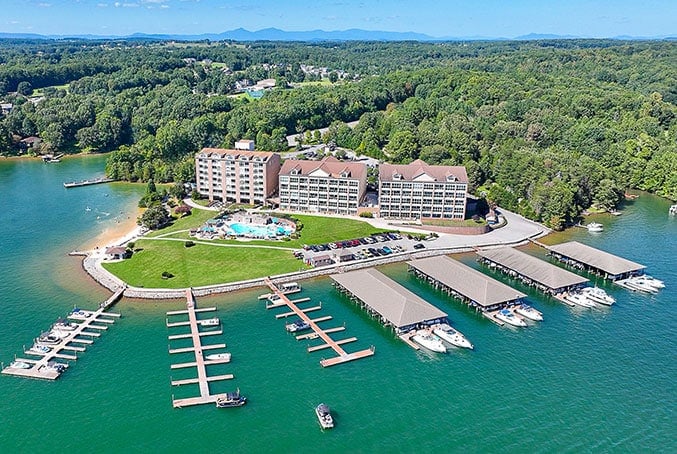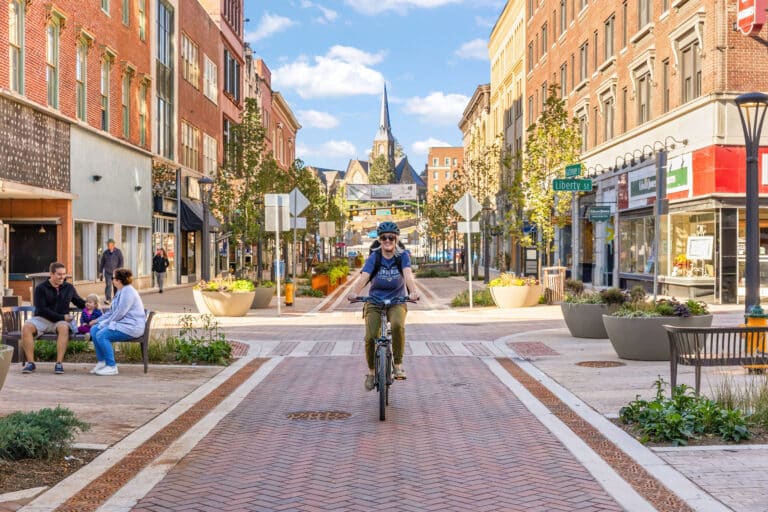
It’s 80 degrees in mid-August, and I am skiing down the side of a mountain in Virginia.
It’s an astonishing feat made possible by the wonders of plastic and engineering. I’m skiing on Snowflex, a manmade composite that feels and responds like snow, allowing you to ski 365 days of the year, regardless of conditions. It’s arguably the most important innovation to hit the snow sports world since the advent of the snowboard.
Perhaps the most surprising aspect of this breakthrough innovation is that it’s being introduced to the U.S. by Liberty University, a private college in Lynchburg, Va., founded by the late TV evangelist Jerry Falwell. It’s a school known primarily for its conservative Christian principles and strict student codes. But recently, Liberty is turning itself into a beacon for the adventure sports culture, and the Snowflex ski slope is just the tip of the manmade iceberg.

This is what you cannot do if you go to Liberty University: You can’t dance. You can’t even attend a party where dancing occurs. You can’t enter the bedroom of a member of the opposite sex. As of 2005, you can wear capri pants and flip flops to class, but you still can’t wear shorts. You can’t participate in a demonstration or protest. You can’t see Braveheart, or any other R-rated movie. If you’re caught committing any of these offenses, you can be subjected to reprimands and fines. It’s all in “The Liberty Way,” the student code of conduct.
Even the faculty is kept under tight reins. Only a few select teachers are tenured; the rest are on one-year contracts, allowing the school administration to release a professor at will if he or she teaches something that doesn’t fit within Liberty’s strict belief system.
As of May 15, 2009, students’ political views are even heavily restricted. Mark Hine, the vice president of student affairs, revoked the university’s recognition of the College Democrats Club, taking away the club’s right to use Liberty’s name and reserve school facilities because the “Democratic Party platform is contrary to the mission of Liberty University and to Christian doctrine,” says Hine.
This is the way Jerry Falwell wanted it when he established the school in 1971. Falwell, often considered the voice of conservative Christians, founded the powerful political lobbying group the Moral Majority, and was the pastor of Thomas Road Baptist Church, a mega-church in Lynchburg with nationally syndicated sermons. He also took over the popular TV show, The PTL Club, after televangelist Jim Bakker was arrested for accounting fraud. Falwell was lauded by staunch conservatives and lambasted by liberals. Reverend Falwell famously blamed the 9/11 attacks on pagans, abortionists, gays, lesbians, and the ACLU.

According to the late reverend, who publicly loathed the separation of church and state in our school system, the privately funded Liberty University was to be a “Bible boot camp,” an institute that churned out “champions for Christ.” According to his son, Jerry Falwell Jr., who now runs the school, the Snowflex center is part of his father’s mission, but some are wondering where snowboarding fits into that evangelical vision.
“A lot of people probably think the last thing Liberty would invest money in would be an outdoor program,” says Josh Yeoman, a former Liberty student, ultra runner, and manager of the school’s trail race series. “You might not think outdoor culture and Christian culture mix, but every university has a mix of people, beliefs, and backgrounds. Liberty is no different.”
According to the school’s administration, the Snowflex ski slope is a tool to help further expand that mix of people.
“What the ski slope boils down to is recruitment and retention,” says Lee Beaumont, Liberty’s director of auxiliary services. “As a Christian university, we don’t have coed dorms and beer bashes. You need to give the kids things to do. Academics are only one part of the college experience. We have all this land that we’ve acquired over the years, why not put it to use?”
 Liberty sits on 5,000 acres, including Liberty Mountain (formerly known as Candler Mountain), a 1,360-foot rolling hill that the school is rapidly turning into an action sports epicenter. In addition to the year-round ski slope, Liberty recently built nearly 65 miles of singletrack and doubletrack, all of which are open to mountain biking, running, and hiking. There’s also a motocross course, and students can ride ATVs on the mountain’s forest roads. A pump track is in the works and so is a downhill mountain bike course. The school has also begun hosting an aggressive trail race series with four foot races and a mountain bike race. It’s all part of “Ultimate LU,” an initiative designed to broaden Liberty’s reputation and increase enrollment to 25,000 on-campus students.
Liberty sits on 5,000 acres, including Liberty Mountain (formerly known as Candler Mountain), a 1,360-foot rolling hill that the school is rapidly turning into an action sports epicenter. In addition to the year-round ski slope, Liberty recently built nearly 65 miles of singletrack and doubletrack, all of which are open to mountain biking, running, and hiking. There’s also a motocross course, and students can ride ATVs on the mountain’s forest roads. A pump track is in the works and so is a downhill mountain bike course. The school has also begun hosting an aggressive trail race series with four foot races and a mountain bike race. It’s all part of “Ultimate LU,” an initiative designed to broaden Liberty’s reputation and increase enrollment to 25,000 on-campus students.
“The mountain bike course and ski slope allow us to reach segments of the population that we normally wouldn’t reach,” Beaumont says, citing the school’s new hockey rink as another recruitment tool that’s allowed Liberty to attract a number of Canadian students.
Beaumont also cites Liberty’s world-class trail system as part of the reason why the small university has become a cross-country running powerhouse in recent years, earning a national championship in 2007 and attracting some of the nation’s top running recruits.

That trail system was founded by Liberty professor and ultra running legend Dr. David Horton. He has won the epic Hardrock Hundred Endurance Run twice, laid claim to the speed hiking records for the Appalachian Trail, Pacific Crest Trail, and the Long Trail in Vermont. He’s run 2,900 miles across the country, puts on one of the most respected ultra race series in the country, and teaches a running class at Liberty that has influenced countless recreational and professional runners over the years.
Horton built the first miles of Liberty trails years ago with the help of his running class students. Today the trail network is over 40 miles long.
 “To have this sort of trail system for training on campus is important to our runners,” Dr. Horton says. “A couple of years ago, the school went onto the mountain and did some trail grading and added some more trails. Now the system isn’t as technical as it used to be, but it’s more accessible. I’ve noticed more students running on the mountain every year.”
“To have this sort of trail system for training on campus is important to our runners,” Dr. Horton says. “A couple of years ago, the school went onto the mountain and did some trail grading and added some more trails. Now the system isn’t as technical as it used to be, but it’s more accessible. I’ve noticed more students running on the mountain every year.”
Not only are there more students running on Liberty Mountain, there are more students attending Liberty University in general. Since 2000, the school has doubled its on-campus enrollment to 11,000, making it the largest evangelical university in the world.
“Spreading the gospel is our primary mission, but this is also a business,” Lee Beaumont says. “Developments like the trail system and ski slope allow us to get into other demographics. Now we can reach the Christian kids who wouldn’t automatically think about going to Liberty.”
It seems to be working. The university has not only doubled its student base, it’s also tripled its revenue as well. Liberty has grown so much in recent years, they’re capping campus enrollment at 15,000 for a short time in order to catch up with pertinent infrastructure developments. Still, the sort of outdoor opportunities that Liberty offers is unmatched even by large Division I schools. Name any other college with 65 miles of mountain bike trails and a year-round ski slope. That major state school your kid is looking at may have an indoor climbing wall, but can its students ski all year—on campus?
Attracting a broader spectrum of students isn’t the only justification for spending $4 million on an artificial ski slope (another donation). There’s also a public relations component to Liberty’s outdoor initiatives. The school’s massive trail system and Snowflex center are all open to the public, and this year, Liberty is offering a trail race series with a singular purpose: community outreach.
“People may have preconceived notions about Liberty,” says Josh Yeoman, the trail race manager. “These races are our way of bringing the outdoor community onto campus so people can see the school for themselves.”
Beaumont is even more direct. “Some people think if you show up to ride our trails or ski our slope that there’s an army of people with Bibles waiting to preach to you. Nobody’s going to force anything down your throat. Part of the reason we’re doing this is to open our doors and show the world that we’re normal.”
Preconceived notions get to the heart of what’s so strange about Liberty’s Snowflex center and expansive trail system. Evangelical Christians aren’t typically associated with extreme outdoor sports like snowboarding and mountain biking.
“It might surprise some people that Liberty is pushing the outdoors,” says Ryan Owens, a Liberty senior who works at Bikes Unlimited in downtown Lynchburg. “Is Liberty as conservative as everyone thinks? Yes and no. You’ve got forced convocation three times a week, and a number of rules that make it very easy to get into trouble. There can definitely be a bit of culture shock if you’re not used to that sort of thing. But there are different sects of people at Liberty that are into different things. And the outdoors is becoming more and more popular with the student body.”

Jeff Fedorko, owner of Lynchburg’s running store, Riverside Runners, has watched Liberty become the cornerstone of the outdoor community in Lynchburg in recent years, and for the most part he applauds the school’s growth and direction. Several regular bike rides and trail runs make use of the mountain’s trail system, and many of Liberty’s top runners have chosen to stay in Lynchburg after graduation, further enhancing the city’s running scene.
“Do you have to be a bleeding-heart liberal to enjoy the outdoors?” Fedorko asks. “It shouldn’t be surprising at all that a conservative town and college are also home to a thriving outdoor community.”
Sure, almost a quarter of all Liberty students’ class hours have to be devoted to religious study, but the school also offers a class in marathon running. As Lee Beaumont says, “The outdoors is God’s creation. I don’t know why anyone would assume the outdoors and Christianity don’t mix.”
To Dr. Horton, Christianity and outdoor sports go hand in hand. He claims his faith gives him strength during his ultra running pursuits, and his popular race, the Mountain Masochist, even features Biblical verses printed on posters at key locations throughout the 50-mile course.
“I have two goals in life: to reach people in terms of taking care of their body physically, and to touch people spiritually,” Dr. Horton says. “I’m trying to improve people’s quality of life on those two levels. I think the physical and spiritual work together in a good way.”
But the stereotypes work both ways. A number of members of the conservative Christian community with a stake in Liberty’s success have voiced concern about opening the University’s doors to boarders and bikers for the sake of enrollment and community outreach.
“You may think snowboarders are all radicals with tattoos who smoke marijuana, but there are good kids who snowboard too,” Beaumont says. “Just because we’re going after skiers and bikers doesn’t mean we’re changing our mission. We’re just expanding.” •
LIBERTY’S SNOWFLEX CENTER
Snowflex is a British creation that’s often considered the “Astroturf of skiing.” It’s basically an all-weather carpeting with a thick shock absorbing layer that’s kept slippery by an integrated sprinkler system. But unlike previous efforts at artificial slopes, Snowflex is also grippy, giving you realistic edge control whether on skis or a snowboard. The carpet is pieced together from large tiles, which has allowed Liberty to design a custom mountain for their students. And since the carpet is permanent, the features will offer a consistency not found on natural snow.
“You’ll know exactly what you’re getting every time you ski here,” says Liberty’s Snowflex manager Bryan Evans. “Without having to worry about the quality of the slope, skiers and boarders will be able to focus on progressing their tricks. It should be a great training tool.”
There are more than 30 Snowflex centers around the world. Liberty is the first open to the public in the U.S. Liberty’s Snowflex center covers roughly an acre of the mountain, featuring a 500-foot vertical drop. It has a beginner slope, a main slope with a table top and kicker, an 11-foot high quarter pipe, grind rails, a cornice drop off, and a tubing run. And a second phase to the slope is being planned for the future that will almost double the ski-able terrain and take the slope to the top of Liberty Mountain.
 LYNCHBURG OUTDOORS
LYNCHBURG OUTDOORS
Liberty University is just one aspect of Lynchburg’s thriving outdoor community. There are currently 32 Ironman triathletes living in Lynchburg, the most per capita of any city in the U.S.
“We’re hardcore down here,” says Jeff Fedorko of Riverside Runners. “We’ve got a strong running community and mountain biking is getting huge too. We’ve got more than a dozen events here in town. That’s unheard of for a town our size.”
Here’s a look at what Lynchburg has to offer off Liberty’s campus.
Blackwater Creek Bikeway: A six mile paved path through the heart of downtown that parallels Blackwater Creek. Mountain bikers and runners love the 13 miles of dirt trails that branch off the greenway in all directions.
Peaksview Park: 10 miles of tight, twisty singletrack in a city park that’s beloved by bikers and runners alike. Bikers should check out the Roller Coaster trail for quick, steep grades.
Virginia 10 Miler: This classic race (36 years and running) pulls more than 1,300 runners to Lynchburg every year. September 26.
Percival’s Island 5-Miler: Flat and fast out and back on the Blackwater Creek bikeway in downtown Lynchburg. July 18.
Bikes Unlimited Tuesday Night Trail Ride: A weekly mountain bike ride on rotating trails throughout Lynchburg. Bring your lights and your lungs: these dudes can pedal. bikesunlimited.com






